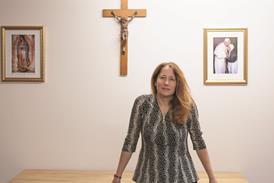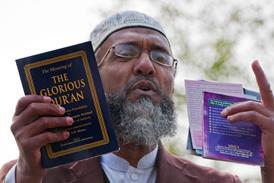Mark Stibbe considers the impact on children growing up without a father
I was born in 1960 to a single parent mum. My biological father walked out on my twin sister and me before we were born. My birth mother couldn’t look after us so we were put in an orphanage in Hackney, East London. We were subsequently adopted and taken to live with Philip and Joy Stibbe, and their son Giles. When we grew up I was sent to Winchester College. When I arrived there were only a handful of pupils who knew Jesus and the prevailing attitude towards Christianity was dismissive. But a revival broke out in the 1970s and by the time I left hundreds had come to the Lord and the atmosphere had completely changed.
I became a Christian there in 1977 at the age of 16. It was the most important moment in my life. Jesus became my Lord, my saviour and my best friend. I was absolutely devoted to Jesus. In fact, I had an exclusively Jesus-centred piety. I knew that God was a Father, but I couldn’t relate to him as my Father because my earthly father had abandoned me. My orphan heart didn’t dare call God ‘Dear Father’ let alone ‘Dad’ or ‘Daddy’ because it was fearful of being abandoned again. In effect, I projected the face of my earthly father onto the face of my heavenly Father.
I am convinced that the greatest problem facing the Britain today is fatherlessness. It’s a tragic fact that so many fathers are either absent or abusive. Not all dads are like this of course. There are fathers who are fully and lovingly involved in the lives of their children. But these are the exception rather than the rule. Today there is a growing and gaping divide between the haves and the have-nots – between those who have decent fathers and those who don’t. If you’re someone who’s got a ‘good enough’ dad, then give thanks and don’t take him for granted. If you’ve been poorly fathered and you feel that there is a yawning cavity in your heart, understand that you are not alone. There are literally thousands who are growing up in Britain today without the love of a father.
On Father’s Day 2008, Barack Obama addressed a church in Chicago. He highlighted the problem today in his own country – a country which has now been described as ‘Fatherless America’. In a passionate and eloquent address he said:
‘If we are honest with ourselves, we’ll admit that what too many fathers are is missing – missing from too many lives and too many homes. They have abandoned their responsibilities, acting like boys instead of men. And the foundations of our families are weaker because of it...We know the statistics – that children who grow up without a father are five times more likely to live in poverty and commit crime; nine times more likely to drop out of schools and 20 times more likely to end up in prison. They are more likely to have behavioural problems, or run away from home, or become teenage parents themselves. And the foundations of our community are weaker because of it.’
You may say, ‘Well that’s America’ – but it’s increasingly true of Britain as well. For far too long our politicians have been reticent and the Church has been silent on the issue of fatherlessness. We are now living with the social consequences of this silence. Britain’s record on family breakdown is the worst in Europe. Three-quarters of the households on social housing estates in the UK are now headed by lone parents, usually mothers. According to a speech given by Iain Duncan Smith, founder of the Centre for Social Justice, in the UK 15% of babies are currently born without a resident biological father and approximately 7% are born with no registered father on their birth certificate.
The consequences for children are toxic. Children who grow up without fathers, in a lone parent environment, are 75% more likely to fail at school, 70% more likely to be drug addicts, 50% more likely to develop an alcohol problem, 40% more likely to have serious problems with debt, and 35% more likely to experience unemployment and a need for social welfare. 70% of young offenders come from fatherless homes.
Everywhere you look today there is what the politicians and sociologists are beginning to call ‘father absence’. We live today in a fatherless Britain and our generation is an orphan generation.
The Disappearing Dad
Why have fathers become such absent and marginal figures in the UK? There are obviously some social and historical factors. The erosion of fatherhood really began a century ago, with the First World War. It is estimated that a quarter of a million fathers died in the battlefields of Europe and that a great number of the fathers who survived returned to their families in a traumatised state, unable to pick up the reins of affectionate fatherhood as they had before.
The Second World War contributed to this decimation of fatherhood. This was followed by the rise of the teenager in the 1950s with its attendant rebellion against authority in general, including fathers and father figures. In the 1960s this was exacerbated by the rise of militant feminism, some of which carried a very explicit agenda against marriage in general (‘wedlock is deadlock’) and the father figure in particular. In addition, we should remember that in this same era we witnessed the growing role of women in the workplace (which meant that mum could be a provider not just dad – no bad thing in itself, but it did mean the traditional male and female family roles were challenged), the alarming increase in the number of divorces, and of course the revolution in attitudes towards sex. Today we are reaping a whirlwind from all these social and historical currents. Fatherhood in any conventional or traditional sense is in danger of extinction.
So there are social and historical factors. But I also believe there are spiritual factors too. I have become increasingly convinced that the campaign against fatherhood has not just been a human one but a demonic one as well.
The apostle Paul said this in Ephesians 6.12:
‘Our struggle is not against flesh and blood, but against the rulers, against the authorities, against the powers of this dark world and against the spiritual forces of evil in the heavenly realms.’
The 100-year assault on fatherhood has not just been the work of human and political forces. It has been the work of the enemy of our souls as well.
Why would the enemy be so eager to destroy fatherhood? One of the main answers is because ‘Father’ is the Christian’s name for God. Jesus revealed that the God who created the universe was and is the world’s greatest Dad. Jesus called him Abba, which in Aramaic means ‘Dear Father’, or ‘Papa’, ‘Daddy’ or ‘Dad’. The enemy wants the word ‘Father’ to lose its currency, value and meaning and he wants it to become as negative as possible. He is terrified of the church becoming Dad’s Army – an army of adopted sons and daughters who have found God to be the world’s greatest Dad. John Eldredge, in Fathered by God (Thomas Nelson) writes:
‘This is the enemy’s one central purpose – to separate us from the Father. He uses neglect to whisper, “You see – no one cares. You’re not worth caring about.” He uses a sudden loss of innocence to whisper, “This is a dangerous world, and you are alone. You’ve been abandoned”...And in this way he makes it nearly impossible for us to know what Jesus knew, makes it so very, very hard to come to the Father’s heart towards us.’
The Hope for Healing
Fatherlessness is a spiritual problem requiring a spiritual solution. In 1986 I was ordained as a curate in the Church of England. I was given the church youth group to lead but it was a nightmare. For ten months or so they didn’t want to listen to me! So, on the advice of a great friend, I took these six very difficult teenagers to a Youth for Christ rally in Derby. At the beginning of the meeting the music group struck up a song about the Father’s love (‘Father God I wonder’, by Ishmael) and I was totally undone. I fell to my knees weeping as the Holy Spirit revealed that God is my heavenly Dad who will never leave or forsake me. I was ruined forever by the revelation of the love of all loves. That night the Spirit of adoption flooded the reservoirs of my heart and I cried out ‘Abba, Father’ for the first time (Romans 8:15). The good news is that there is a Father in heaven whose Son Jesus Christ came to this earth to bring us home to the Father’s arms of love. As Paul puts it in Ephesians 2:18, everyone on the planet is invited to the Father, through Jesus and in the power of the Holy Spirit. We all have access to the perfect Dad through the cross.
The good news is that the Holy Spirit is working today in the hearts of the fatherless and indeed in the hearts of fathers. The Spirit of adoption is bringing healing to many orphan hearts and raising up a church which knows the Father’s love. Churches filled with Abba’s love are the hope for a fatherless world. Such churches will equip spiritual fathers and spiritual mothers to mentor those who have never known the love of a father or mother (a good example of this can be found at thementoringproject.org). They will run programmes for the healing of wounded, orphan hearts and they will celebrate the idea of the church as family.
A Ministry is Born
On March 7th 2007, while on sabbatical from St Andrew’s Chorleywood, I flew to Boston to speak about the Father’s love to a mainly African American church in the inner city. On the way out I had what I can only describe as an encounter with the Father. I sensed him saying, ‘I want you to get back on message’. ‘What’s my message?’ I asked. Immediately these words came to mind. ‘Your message is the Father heart of God, spiritual adoption, and the healing of the orphan heart. Get back on message’. Wisely I said, ‘Yes, Lord’.
I had no idea at that stage what the consequences of saying ‘yes’ were to be, but in the course of the next seven days, two people with the gift of prophecy – who knew nothing about what was going on in my heart – confirmed this word and by the time I had finished preaching the following weekend in Pittsburgh I knew that my time at St Andrew’s was coming to an end. I knew that the Lord had issued me a new calling, to take the Father’s love to the fatherless and to bring an end to the global pandemic of fatherlessness. I knew that I was going to spend the rest of my life concentrating on doing this one thing.
Several weeks later I was in a Ugandan orphanage speaking to hundreds of orphans about my experience of being abandoned by my earthly father, and my story of discovering in Abba, Father, the love that I had missed from my biological dad. As I looked at all the children listening attentively to every word I said, the penny suddenly dropped. My story of being orphaned was actually a gift from my heavenly Dad. If I hadn’t gone through that experience I would have no ability to relate so deeply to the fatherless. Even as I was speaking to the children I started thanking my Father in heaven that nothing in my life had been wasted and that even the tough stuff he had turned to good.
Mark Stibbe’s latest book I Am your Father: What Every Heart Needs to Know (Monarch) is out now.



























